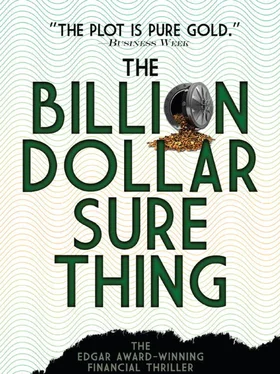Stepanov was working himself up into quite a state. But in this restaurant no one noticed. As usual the atmosphere was boisterous. The alcohol was flowing faster and faster as the hour grew later.
“What have you got in mind, Valentajn?”
“I think that you and I—both of us—must approach the committee, immediately.”
“But do you really feel that it is that important?”
“There can be no doubt. A grave error is being committed.”
“Are you sure of your grounds?”
“Positive!”
“I will make the arrangements, Valentajn.”
“Many many thanks, Josef. You are a true friend.”
The orchestra, seated on the balcony against the background of a wildly colourful mural depicting the Alpine-like scenery of that corner of Russia so dear to the hearts of the majority of guests, struck up another tune with slightly off-key gusto. The two men decided that another bottle of champagne was in order, with just a touch of vodka on the side.
THE next morning in Zurich the banks started their foreign exchange operations as usual. On this Wednesday, business was brisk, as usual; rumours were flying, as usual. And the Swiss were making money, as usual, in what many people regard as the most difficult of financial markets. Foreign exchange comes natural to the Swiss, and for many years they have been exploiting this natural resource to the hilt.
The development of this unusual talent stems from that fact that almost every Swiss is somehow involved in foreign exchange transactions from a very early age. Living in a small country in the centre of Europe, no Swiss is ever more than a hundred miles from some border—that of France, Germany, Austria, or Italy—and the rates of exchange between the Swiss franc and those of these neighbouring countries are as familiar a fact as the price of gasoline is to the average American, or the cost of a pint of beer to a Welshman. In fact, many a Swiss will be able to quite readily tell you the price of gasoline in all of his neighbouring countries, expressed in terms of Swiss francs or even dollars if you like, since, with his built-in frugality, he will always calculate very carefully whether he should fill up his tank at home, or abroad, when he sets out on a Sunday drive across the border with his well-polished automobile. In other words, he goes through constant and sometimes complex foreign exchange calculations as a matter of course in his daily life. Take, for instance, a citizen of Basel. This second-largest city in Switzerland borders immediately upon both France and Germany. It is quite natural for a Bâlois to go shopping in Germany, just across the border, in the afternoon, seeking bargains in the supermarkets, and then go over to France for dinner in the evening, attracted especially by the price and quality of the wine. He does not go back and forth to the bank twice a day buying the required German marks or French francs. No, he just keeps their separate compartments in his billfold—one for each of the three currencies which are part of his everyday life.
What is unique about Switzerland is that they play all currencies against all other currencies. By contrast, in London, for example, the foreign exchange market is almost totally restricted to pound sterling–U.S. dollar transactions. In New York, it is the dollar’s price in terms of sterling, the German mark, the Japanese yen, and the Canadian dollar which preoccupies traders. But in Zurich, they will be juggling yen against pounds, German marks against Dutch guilders, Swiss francs against Italian lire, and work out a fair price for black-market rubles against the U.S. dollar. They will quote you a price on the Iranian rials, including the cost of picking them up in cash form in Teheran, and converting them into Swiss francs for deposit in Geneva under a number or a phony name.
The nerve centre of these operations are the foreign exchange trading departments of the major Swiss banks, always a very large room, packed with communications equipment. The traders—up to a dozen of them—sit around an oval-shaped desk of immense proportions. Each man has two telephones at his disposal, often three. Each phone has at least six separate outside lines. Thus each trader can literally be talking to a large number of people at the same time. On telephone one, line two, he may have a customer in Hong Kong. On telephone two, line four, he may have the FX desk of the Deutsche Bank in Frankfurt. On the same telephone, line six, he may have his counterpart in the bank’s branch in London on a standby basis. On telephone three, line one, he could have a money broker in Geneva. And three or four other lines might be flashing, as incoming calls stack up. The trader plays his telephones like an electronic organ—pushing keys, pulling stops, and creating quite a bit of noise in the process as he yells, and even screams, his instructions. The cacophony is added to by the constant clattering of Telex machines which line the walls of the huge room—often a dozen machines, all banging out information on market conditions from the various financial capitals of the world, or bringing in confirmations of transactions just completed minutes ago by telephone. Girls scurry around, tearing off urgent messages and placing them in front of the trader involved, who barely glances at them during telephone calls, signs his O.K., and passes them back. It often takes him just two seconds to finalize transactions involving tens of millions of dollars.
On the wall is a scoreboard, resembling those we are so used to from sports arenas. Prices of all major currencies, in terms of Swiss francs, are constantly being posted electronically—in line with the latest trades—thus keeping everyone in the room informed. Very quietly, in a corner, three other men pore over long sheets of paper. They post the so-called position sheets. Each trade is immediately entered, allowing the chief of the department to tell at a glance the net position of the bank. In one hour from opening, his traders might have sold $200 million and bought $210 million—leaving the bank a net position of $10 million. He tries to keep the two figures in close balance, unless of course he receives instructions to the contrary from the big guys.
It was into just such an atmosphere that Dr. Walter Hofer walked on the morning of November 5. He was accompanied by a young lady of perhaps twenty-two or twenty-three. In spite of the hectic activity, none of this escaped anyone in the room. It was unusual enough for the chairman of the General Bank of Switzerland to appear in the foreign exchange trading room. But to see him there, with a well-built young blonde—that was an event to be cherished, every minute of it.
Hofer walked directly to the chief trader.
“Herr Zimmerer, I would like to introduce Miss Mary Rogers.” He spoke in English. “She is with a newspaper in Los Angeles and would like to learn a little about your operations. Miss Rogers is the daughter of my wife’s sister who, as you probably do not know, has been living in the States for the last thirty years. So please take good care of her. When you’re finished, I would appreciate it if you could bring her up to my office. I would like to have a few words with you before the morning is over.”
“With great pleasure, sir,” replied Zimmerer, as Hofer turned and left as abruptly as he had come.
“Now please don’t go to any great trouble on my account. I know you must be very busy,” said the petite Miss Rogers, five feet two, with blue eyes to go along with her long blonde hair and a bosom which could not be totally overlooked, even if she was the big boss’s niece.
“No trouble at all,” mumbled Zimmerer, thinking oh my God and on a morning like this. The Swiss never have learned how to mix business with pleasure during working hours except at the highest echelons.
Читать дальше












